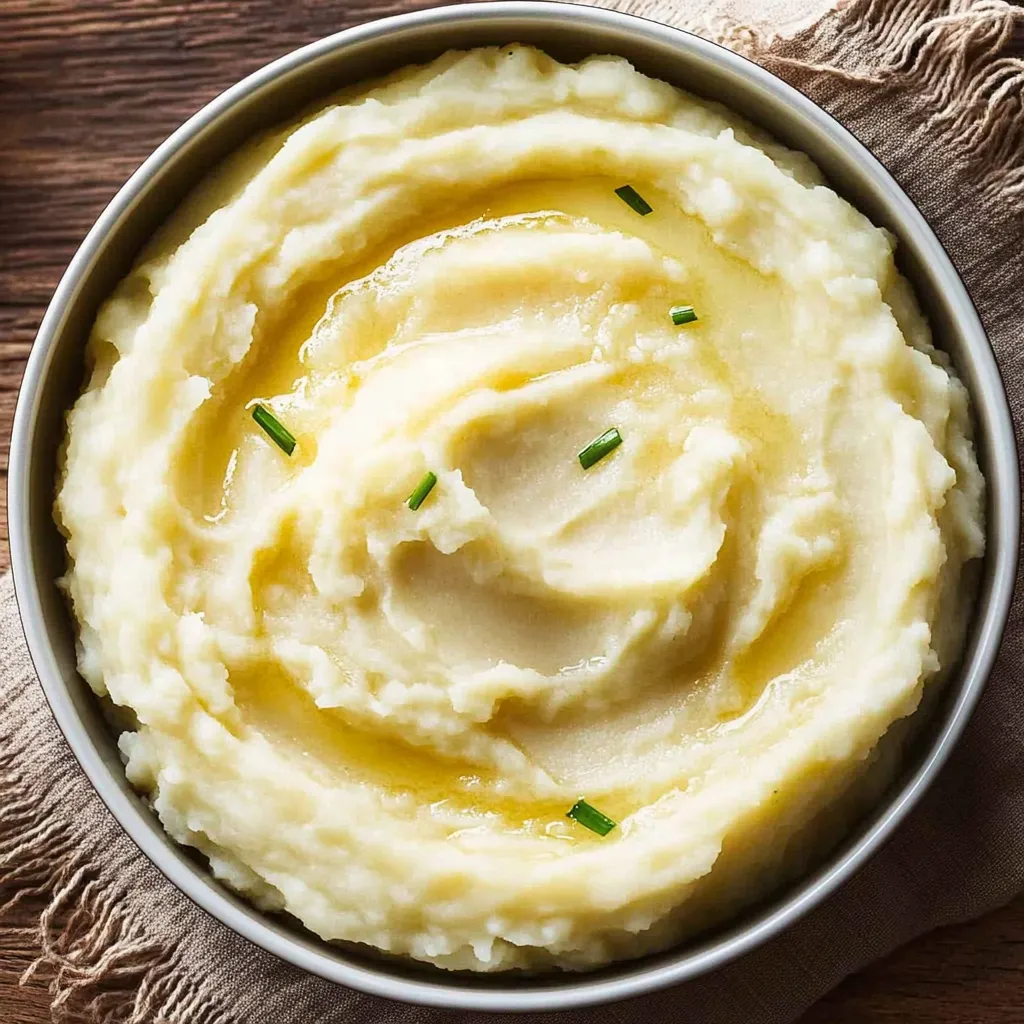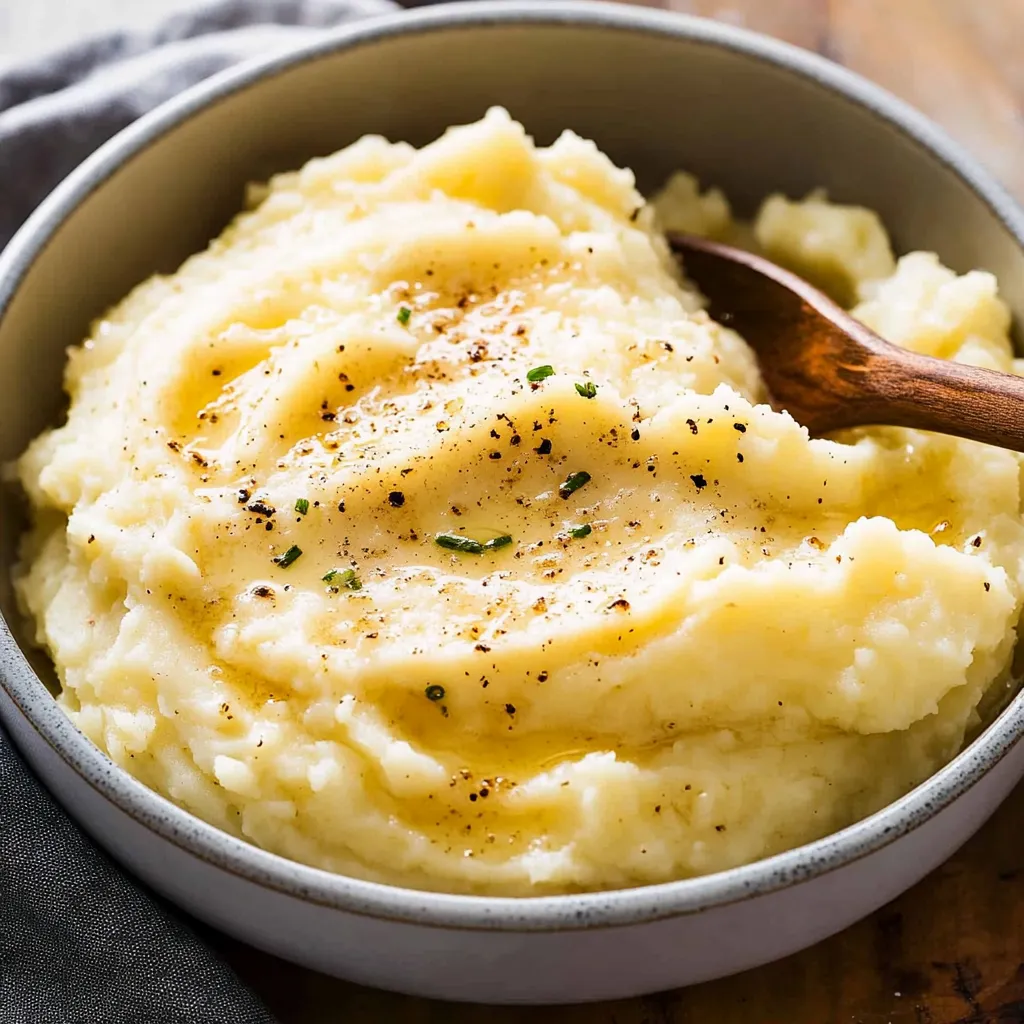 Pin it
Pin it
These luxurious roasted garlic mashed potatoes transform a simple side dish into an unforgettable culinary experience. Velvety smooth Yukon gold potatoes blend seamlessly with rich cream, butter, and the deep, mellow sweetness of slow-roasted garlic for a combination that elevates any meal. The secret lies in the perfect balance of starchy potatoes and indulgent fats, creating a silky texture that melts in your mouth with each flavorful bite.
I served these potatoes at a dinner party last month, and my friend who claimed to "hate garlic" couldn't stop asking what made them so delicious. My mother-in-law, who guards her own mashed potato recipe fiercely, actually requested this recipe after trying them!
Ingredients
- Yukon gold potatoes - The foundation of perfect mashed potatoes with their naturally buttery flavor and ideal starch content. Their medium starch level creates the perfect texture—not too gluey like russets can become, and not too waxy like red potatoes.
- Whole garlic cloves - Transformed through slow cooking into sweet, nutty morsels that infuse the potatoes with deep flavor. Roasting eliminates any harsh bite, leaving only the complex, mellow essence of garlic.
- Olive oil - Creates the perfect environment for slow-roasting the garlic, developing its sweetness while preventing burning. The infused oil becomes another flavor component in the finished dish.
- Heavy cream - Contributes luxurious richness and helps create that silky-smooth texture. Its high fat content carries flavor beautifully throughout every bite.
- Unsalted butter - Adds incomparable richness and that distinctive buttery flavor that makes mashed potatoes irresistible. Using unsalted allows precise control over the final seasoning.
- Sour cream - Introduces a subtle tanginess that balances the richness of the cream and butter. Its thickness also helps achieve the perfect consistency.
- Salt and pepper - Essential seasonings that enhance all the other flavors. Proper seasoning is what separates good mashed potatoes from extraordinary ones.
Instructions
- Create flavorful garlic confit
- by placing 12 peeled whole garlic cloves in a small saucepan with 1/2 cup olive oil. Heat this mixture over very low heat—you're looking for tiny bubbles around the edges, not a vigorous simmer. Cook for about 20 minutes, stirring occasionally, until the garlic turns a beautiful golden brown and becomes completely tender. This slow cooking process transforms the garlic's flavors from sharp and pungent to sweet and mellow. The oil should never smoke or the garlic will become bitter. Once finished, carefully strain the garlic cloves from the oil using a fine-mesh sieve, reserving both the cloves and the now garlic-infused oil separately.
- Prepare the potatoes with care
- by selecting 3 pounds of similar-sized Yukon gold potatoes for even cooking. Peel them completely for the smoothest texture, and cut them into quarters or roughly 2-inch chunks of consistent size. Place these potato pieces in a large pot and cover them with cold water by about 1 inch—starting with cold water ensures even cooking from the inside out. Add 1 tablespoon of salt to the water, which seasons the potatoes from within as they cook. Bring this pot to a gentle boil over medium-high heat, then reduce to maintain a low, steady simmer.
- Cook potatoes to perfect tenderness
- for approximately 15-20 minutes. The exact time will depend on the size of your potato chunks, so begin testing after 15 minutes by piercing the largest piece with a fork—it should slide in and out effortlessly with no resistance. Be vigilant about not overcooking the potatoes, as waterlogged potatoes will become gummy rather than fluffy. Once tender, immediately drain the potatoes in a colander, then return them to the hot, empty pot for about 1 minute, gently shaking to allow excess moisture to evaporate. This critical step ensures your potatoes won't be watery.
- Prepare the cream mixture
- while the potatoes are cooking by combining 1 cup heavy cream and 1 stick (8 tablespoons) unsalted butter in a small saucepan. Warm this mixture over low heat until the butter melts completely, then keep warm but not boiling. The temperature of this mixture is important—cold dairy products would cool down your potatoes too quickly and make them difficult to incorporate smoothly, while overheated dairy can develop an unwanted cooked flavor.
- Create perfectly smooth potatoes
- by passing the hot, drained potatoes and roasted garlic cloves through a food mill fitted with the finest disc. This specialized tool creates the silkiest texture by forcing the potatoes through tiny holes while leaving any fibrous bits behind. If you don't have a food mill, a potato ricer is the next best option. Alternatively, you can use a stand mixer with the paddle attachment or a hand mixer, though be careful not to overmix, which can make potatoes gluey. Return the milled potatoes to the warm pot to maintain their temperature.
- Incorporate the fats gradually
- by adding about two-thirds of the warm cream-butter mixture to the milled potatoes. Gently fold with a silicone spatula or wooden spoon using a lifting motion rather than vigorous stirring. Once incorporated, add 1/2 cup sour cream and 2 tablespoons of the reserved garlic-infused olive oil, continuing to fold gently. The potatoes should be smooth and silky but still hold their shape—not runny. If they seem too thick, gradually add more of the cream mixture until you reach your desired consistency.
- Season to perfection
- by adding salt and freshly ground black pepper to taste. Start with 1 teaspoon of salt and 1/2 teaspoon of pepper, then adjust according to your preference. Remember that properly seasoned mashed potatoes often require more salt than you might initially think—the fat content requires adequate seasoning to shine. For the final touch, transfer to a warm serving bowl, create a small well in the center, and add a pat of butter that will melt enticingly over the potatoes. Garnish with freshly chopped chives for a pop of color and subtle onion flavor.
 Pin it
Pin it
I discovered that adding a small splash of the garlic-infused oil to the butter I place on top before serving creates an aromatic experience that elevates the entire dish. My grandmother always said "we eat first with our eyes, then our nose, then our mouth," and this simple addition proves her wisdom—the fragrance that rises from the hot potatoes makes them irresistible before the first bite.
The Science of Smooth Potatoes
Understanding the starch structure of potatoes is key to achieving that perfect texture. When potato cells are heated, the starch granules absorb water and swell. How these swollen cells are then broken affects the final texture dramatically. The gentle press of a food mill or ricer breaks the cells while minimizing damage to the starch structure. In contrast, using a food processor or overbeating with a mixer can rupture these cells completely, releasing too much starch and creating a gluey, unpleasant texture. This is why hand tools or gentle mechanical methods produce superior results. Additionally, incorporating fats while the potatoes are still hot ensures the starch granules can absorb these flavors before they set, resulting in more flavorful potatoes with better mouthfeel. I learned this distinction after a memorable disaster involving a food processor and what became essentially potato glue—a mistake I've never repeated!
Perfecting Garlic Confit
The slow-cooked garlic is what truly distinguishes these mashed potatoes from ordinary versions. Traditional roasted garlic requires oven time, but this stovetop confit method offers more control and infuses oil that becomes an additional flavor component. The key is genuinely low heat—around 200°F if you were to measure it. At this temperature, the garlic slowly softens and caramelizes without developing bitter notes. A common mistake is rushing this process with higher heat, which produces acrid flavors rather than sweet ones. Patience yields garlic cloves with a spreadable, buttery consistency and complex, almost caramelized sweetness. For variation, try adding a sprig of thyme or rosemary to the oil during cooking for subtle herbal notes. I've experimented with many garlic preparation methods over the years, and this confit approach consistently produces the most nuanced, mellow garlic flavor that even those who typically find garlic overwhelming can appreciate.
Make-Ahead Strategies
While these mashed potatoes are at their absolute peak when freshly made, there are several strategies for preparing components ahead of time, especially helpful for holiday meals or entertaining. The garlic confit can be made up to three days in advance—store the cloves and oil separately in airtight containers in the refrigerator. Simply bring to room temperature before using. For the potatoes themselves, you can prepare them up to two hours ahead by following the recipe completely, then transferring to a heatproof bowl. Cover the surface directly with plastic wrap to prevent a skin from forming, then place the bowl over a pot of barely simmering water to keep warm without overcooking. For longer storage, I've found the best reheating method is to place refrigerated potatoes in a heatproof bowl over simmering water, adding a splash of warm cream as they heat and stirring occasionally until they reach the original creamy consistency.
I first developed this recipe years ago while trying to recreate a memorable side dish from a special anniversary dinner. After several attempts that were good but not great, I discovered the magic combination of food-milled potatoes and slow-cooked garlic that made all the difference. What began as an attempt to impress my spouse has become our most requested contribution to family holiday meals. There's something deeply satisfying about transforming humble ingredients like potatoes and garlic into something so luxurious that it outshines even the most elaborate main dishes. The way conversation inevitably pauses for that first appreciative bite tells me these potatoes have achieved exactly what great food should—they bring people together in a moment of shared pleasure.
Frequently Asked Questions
- → Can I make these mashed potatoes ahead of time?
- Yes, you can make these up to 1 hour ahead. Just keep them covered and warm over very low heat until ready to serve.
- → How long do leftover mashed potatoes last?
- Leftovers can be stored in the refrigerator, covered, for up to 4 days. They can also be frozen for up to 2 months, though they may lose some moisture and flavor.
- → What's the best way to reheat these potatoes?
- Place your portion in a small saucepot, stir in a little butter or milk, and heat over low until hot throughout.
- → Do I need to peel the potatoes?
- It's optional. You can leave the skins on for extra nutrients - just wash them well before cooking. The recipe will work either way.
- → What makes these mashed potatoes so creamy?
- The combination of heavy cream, butter, sour cream, and roasted garlic oil creates an ultra-creamy texture without making them runny.
